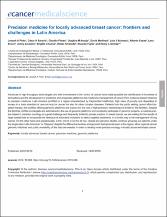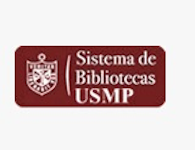| dc.contributor.author | Pinto, Joseph A. | |
| dc.contributor.author | Saravia, César H. | |
| dc.contributor.author | Flores, Claudio | |
| dc.contributor.author | Araujo, Jhajaira M. | |
| dc.contributor.author | Martínez, David | |
| dc.contributor.author | Schwarz, Luis J. | |
| dc.contributor.author | Casas, Alberto | |
| dc.contributor.author | Bravo, Leny | |
| dc.contributor.author | Zavaleta, Jenny | |
| dc.contributor.author | Chuima, Brigitte | |
| dc.contributor.author | Alvarado, Hober | |
| dc.contributor.author | Fujita, Ricardo | |
| dc.contributor.author | Gómez, Henry L. | |
| dc.date.accessioned | 2020-05-28T15:06:13Z | |
| dc.date.available | 2020-05-28T15:06:13Z | |
| dc.date.issued | 2019-01-22 | |
| dc.identifier.citation | Pinto JA., Saravia CH., Flores C., Araujo J., Martínez D., Schwarz LJ., et al. Precision medicine for locally advanced breast cancer: frontiers and challenges in Latin America. ecancer. 2019; 13: 896. | es_PE |
| dc.identifier.uri | https://hdl.handle.net/20.500.12727/6105 | |
| dc.description.abstract | Advances in high-throughput technologies and their involvement in the ‘omics’ of cancer have made possible the identification of hundreds of biomarkers and the development of predictive and prognostic platforms that model the management of cancer from evidence-based medicine to precision medicine. Latin America (LATAM) is a region characterised by fragmented healthcare, high rates of poverty and disparities to access to a basic standard of care not only for cancer but also for other complex diseases. Patients from the public setting cannot afford targeted therapy, the facilities offering genomic platforms are scarce and the use of high-precision radiotherapy is limited to few facilities. Despite the fact that LATAM oncologists are well-trained in the use of genomic platforms and constantly participate in genomic projects, a medical practice based in precision oncology is a great challenge and frequently limited to private practice. In breast cancer, we are waiting for the results of large basket trials to incorporate the detection of actionable mutations to select targeted treatments, in a similar way to the management of lung cancer. On the other hand and paradoxically, in the ‘one fit is not for all’ era, clinical and genomic studies continue grouping our patients under the single label ‘Latin American’ or ‘Hispanic’ despite the different ancestries and genomic backgrounds seen in the region. More regional cancer genomic initiatives and public availability of this data are needed in order to develop more precise oncology in locally advanced breast cancer. | es_PE |
| dc.format.extent | pp. 896 | es_PE |
| dc.language.iso | eng | es_PE |
| dc.publisher | ECancer Medical Science | es_PE |
| dc.relation.ispartof | urn:issn:1754-6605 | |
| dc.relation.ispartofseries | Ecancermedicalscience;vol. 13 | |
| dc.relation.uri | https://doi.org/10.3332/ecancer.2019.896 | es_PE |
| dc.rights | info:eu-repo/semantics/openAccess | es_PE |
| dc.rights.uri | https://creativecommons.org/licenses/by/4.0/ | es_PE |
| dc.source | Repositorio Académico USMP | es_PE |
| dc.source | Universidad San Martín de Porres - USMP | es_PE |
| dc.subject | Neoplasias de la mama | es_PE |
| dc.subject | Medicina de precisión | es_PE |
| dc.subject | Genoma | es_PE |
| dc.title | Precision medicine for locally advanced breast cancer: frontiers and challenges in Latin America | |
| dc.type | info:eu-repo/semantics/article | es_PE |
| thesis.degree.name | Medicina Humana | es_PE |
| thesis.degree.grantor | Universidad de San Martín de Porres. Facultad de Medicina Humana | es_PE |
| thesis.degree.discipline | Medicina | es_PE |
| dc.subject.ocde | https://purl.org/pe-repo/ocde/ford#3.02.00 | es_PE |









